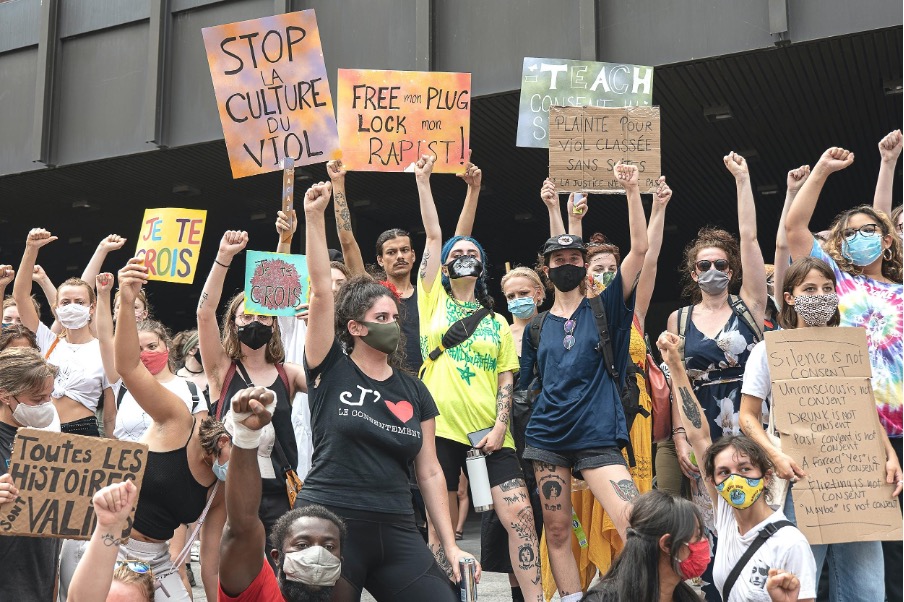 LSE’s Kathryn Claire Higgins looks the issue of women’s ‘believability,’ and how popular entertainment television shows have addressed the question of whether women are believed when they accuse men of sexual violence or harassment.
LSE’s Kathryn Claire Higgins looks the issue of women’s ‘believability,’ and how popular entertainment television shows have addressed the question of whether women are believed when they accuse men of sexual violence or harassment.
In the aftermath of the #MeToo moment, the question of whether, when, and how to believe women when they accuse men of sexual violence and harassment has become a heated point of cultural anxiety and contention. For some, the call to #BelieveWomen represents a frightening abandonment of rational scepticism and due process. Critics warn that women are now too easily believed, evading even the most basic forms of scrutiny. Others, however, have positioned #BelieveWomen as a cultural response to the historical unbelievability of women—a necessary counterweight to the resilient tropes of ‘woman as particular’ (and so, never authoritative) and ‘woman as liar’ (and so, never truthful), which compound and conspire against women when they speak out about sexual violence.
Women’s unbelievability is, of course, profoundly uneven. From the horrific murder of Emmett Till to the new visibility of the ‘Karen’ in popular culture, there are all too many examples confirming that white women (especially, affluent white women) possess a form of conditional believability that can be, and frequently is, weaponized against people of colour, including men. As Ruby Hamad writes in White Tears/Brown Scars, the historical articulation of white womanhood with ‘innocence’ has fostered a cultural impulse to “soothe white women’s emotional distress”, allowing believability to be more easily accessed through the language and performance of pain. In her recent book The Right to Sex, Amia Srinivasan adds that “the politics of ‘Believe Women’… collides with the demands of intersectionality” by obscuring how the believability of white women has historically contributed to both the hypersexualization of Black masculinity and the silencing of women of colour.
In our recent article in Television and New Media, Sarah Banet-Weiser and I consider how these questions and cultural anxieties have spilled over into the world of entertainment television. Through analysis of three recent and highly popular dramas (Netflix’s Unbelievable, Apple TV’s The Morning Show, and Michaela Coel’s HBO/BBC One drama I May Destroy You) we examine how the problem of believability is being reflexively tackled in scripted stories about sexual violence on television. While all three shows are officially fiction, they approximate ‘real world’ cases of sexual violence and misconduct. Unbelievable and I May Destroy You are directly based on true events, while The Morning Show closely echoes the case of Matt Lauer, who was fired from NBC News in 2017 following allegations of rampant sexual harassment and misconduct, as well as assault.
These shows are just three examples of the emerging genre of ‘#MeToo Media’, which includes not only television series and episodes but also a growing list of books, podcasts, films, and social media productions. The animating concern within the genre is the question of the political legacy of #MeToo—what this spectacularly visible ‘truth speaking’ movement has, and has not, done to advance gender and racial justice as it relates to sexual violence. Social media carries the implicit promise that more people can speak out about their experiences and be heard, as many have. But that speech, those voices, continue to be subject to familiar structures of power which suffuse both online and offline cultural spaces: patriarchy, white supremacy, and capitalism.
Economy of believability
We consider the question of believability through the lens of what we call an economy of believability. Within this context, belief is a commodity to be worked for and (precariously) secured through various intersecting forms of labour. ‘Truthful’ speech is, by extension, not something women can simply do, but rather, something women must earn. In the economy of believability (as in most economies), powerful white men have been historically centred as ‘truth tellers’. Women, people of colour of all genders, working class people, queer people, trans people, sex workers, and others, are placed at varying degrees of marginality. What does it take, we ask, to become believable within such a context? Our analysis highlights three key forms of necessary labour.
First, through an analysis of Unbelievable, we consider believability as an affective performance. As a condition contingent in the recognition of others, believability often requires inhabiting through performance a ‘believable victimhood’ that will feel authentic to those who occupy positions of institutional and cultural power—police officers, judges, journalists, employers, public commentators; people who are overwhelmingly white and often men. When Unbelievable protagonist Marie reports her assault to the police, she is doubted when she fails to perform victimhood in a way that people in positions of power can easily recognise—for ‘seeming fine’, in the words of her stepmother, Coleen.
This echoes real-life stories like that of actress Jessica Mann. When Mann first publicly accused disgraced media mogul Harvey Weinstein of rape, many doubted her on the basis of her personal relationship with Weinstein, which continued after the assaults. While remaining in a friendship or romantic relationship with an abusive and/or sexually predatory partner is not uncommon (Mann described her relationship with Weinstein as ‘complicated’), to many this simply didn’t feel like how an assaulted person would—or should—behave.
Second, our analysis of The Morning Show considers the costs of believability, which we propose must be paid through visible spectacles of loss and suffering. One of the most pernicious mythical backlashes against #MeToo—advanced in particular by Men’s Rights Activists (MRAs) and their allies—is that women have something to gain from falsely accusing men of sexual violence and misconduct. In such a context, only visible spectacles of the very opposite—of loss, of suffering, of pain—can possibly authenticate women’s claims. In The Morning Show, only an ultimate and existential loss—a death—can shake belief loose from a resilient culture of denial, awakening the predatory Mitch Kessler’s colleagues to the violence of his conduct.
In the ‘real’ world, women are too often accused of using sexual assault allegations to pursue fame, money, professional opportunities, or reputational restitution. It’s a cruel double-bind: those with something to (potentially) gain from speaking out about their experiences of sexual violence are presumed to be acting in self-interest, while those with nothing to gain—those who already possess wealth, professional opportunities, or social status—are presumed not to be ‘truly’ injured. The only way out is loss, both lived as suffering and performed as public spectacle.
Finally, our analysis of I May Destroy You considers the question of value, and the forms of labour required to attach value to belief so that it can be transformed into meaningful solidarity and material support. Belief has to do something in the world to have power, and for women like protagonist Arabella—a young Black author, creative, and social media influencer—belief does far too little. Though Arabella is widely believed, the trauma and writers’ block she faces in the aftermath of her assault mean she nonetheless encounters mounting professional crisis and debt.
A key afterlife of the #MeToo moment, however, is the new marketability of sexual violence—and so the rendering of believability through commercial logics. In this context, Arabella works entrepreneurially to integrate sexual assault survivorship into her ‘brand’ as a social media influencer, skilfully (though often, detrimentally) performing it in ways most compatible with the demands of visibility, resilience, and individual empowerment which characterise corporate media.
In the cultural aftermath of #MeToo and amid renewed conversations about the violent potential of “white women’s tears”, it is worth reflecting on what becoming believable means and wants in a corporatized, patriarchal, and white supremacist media culture. What these three shows reveal together is that ‘speaking out’ is never enough: even for the most visible and audible survivor, believability takes work. Too often, however, this work is futile. While some (usually white, usually affluent) women may be able to ‘earn’ belief through performance, payment, and entrepreneurialism, these three forms of labour nonetheless keep the recognition of powerful men—those whom women must be believed by—firmly at the centre of our public truth culture.
The question of truth remains, as it has always been, a feminist question. But the question cannot be: How can women ‘succeed’ within and through the economy of believability as it currently operates? It must be, can only be: How might truth, as a core public value, be reimagined as a tool for sexual and racial justice? How might the economy of believability be otherwise?
Sarah Banet-Weiser and Kathryn Claire Higgins’ book, Believability, is forthcoming with Polity Press. Their article ‘Television and the “honest” woman: mediating the labor of believability’ is available online first in Television and New Media. This article represents the views of the authors and not the position of the Media@LSE blog, nor of the London School of Economics and Political Science.
Featured image: Photo by Mélodie Descoubes on Unsplash





